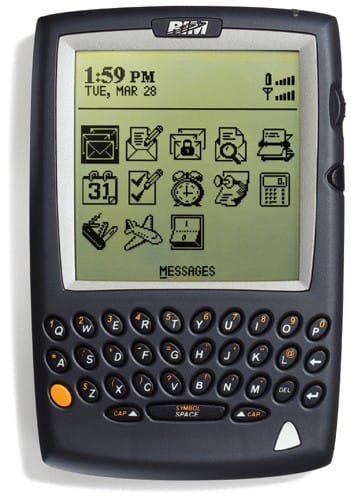Saving RIM in Three Easy Steps

Since RIM’s disastrous “earnings” report last week, and their CEO’s insane (either that or completely out of context) comments, a lot of people have been dancing on their soon-to-be grave. And even more people who have never run a business bigger than a lemonade stand or managed anything beyond a WordPress account, have been offering their advice to RIM on how they could overcome their current troubles. I will now join the latter group with some advice on how to save Canada’s tech crown jewel. Seriously, look at my three point plan at re-imagining RIM’s business and tell me this couldn’t (maybe) work.

Step 1 – Ditch the OS/Hardware game. Walk away.
There was a time when RIM made lustful gadgets better than anyone, with battery life measured in days, not hours. But that was in the days when QWERTYs ruled, and people had the expectation that their phones would last at least through a day of constant use. But it’s clear that the industry has moved on. We live in a touchscreen world and people are learning how to use virtual keyboards just as fast as QWERTYs (have you seen a teenager text on an iPhone??). And everyone complains about poor battery life, but now we have come to expect and accept these limitations on phones with big screens, fast processors and all the other spoils that come with increased power consumption. True, RIM could continue to develop BB10 and design handsets that more meet the new smartphone paradigm, but they’ve already lost this game (at least in the North American market). They couldn’t just make a “good enough” BB10 device, it has to be miles better than Android/iOS phones. I don’t see that happening. Oh, and no one will shed a tear over the PlayBook going missing, either.
Step 2 – Retrench in the enterprise.
Now that RIM is no longer in the hardware business, they need to focus on a market they once dominated (enterprise), rather than a market they could never crack (consumer). RIM’s NOC based enterprise email setup is so much more secure than a Microsoft Exchange setup that you get with the iPhone or an Android device. For some companies, Exchange is enough. But many verticals need the dual level data encryption (network/device) that RIM provides, such as the medical (who need to be HIPPA compliant), financial, legal, or public sector (government) verticals. The only other company that provides this level of security at this scale, is Good Technology (see disclosure below). Good has thousands of customers in all the above verticals who use their RIM-like security services to allow their employees to use their own Android and iOS devices instead of company-issued BlackBerry devices. RIM, who settled various patent fights with Good Technology (and Visto, the company that bought and subsequently took on the Good brand) by paying them hundreds of millions of dollars, should acquire Good Technology and completely dominate the enterprise once more. RIM may not have enough cash on hand to afford Good outright, but if they sell their near complete BB10 OS to someone who wants a mobile operating system (ahem, Facebook), and with the money they save by cutting all the RIM jobs devoted to hardware, Good might be attainable.
Step 3 – Focus on B2B services (and make BBM cross platform for chrissakes!)
Now we are looking at RIM, the software company, which owns mobile enterprise security. Next, they need to pull a full IBM. IBM famously reinvented itself by becoming a consulting company. Just imagine how fertile the ground would be for RIM, bolstered by its existing knowledge and patents, to come in and consult about mobile technology. I know it’s somewhat counterintuitive to suggest that RIM, which has made pretty much every mis-step it possibly could in the last five years, become a consultant, but I’m talking about consulting on the specifics of technology, not corporate or marketing strategy. For all the grief it gets, RIM still has top notch employees and technical know how, especially when it comes to mobile security and managing data traffic efficiently.
Lastly, RIM needs to make BBM cross-platform so they can own IP messaging. If they choose not to have a consumer app that distracts from their new consulting business, they can open source BBM or open up the API and let third party devs take care of the clients.
So that’s my advice to RIM, take it or leave it. The only way for them to survive is to recognize that it’s not 2008 anymore. They can’t compete as a consumer company, or even as a hardware maker. It’s better to be a smaller specialist than a dead behemoth.
Disclosure: Good Technology is a former client of mine, and I still have friends in that organization. But any acquisition speculation is just that, I have no inside knowledge of Good’s inner-workings or even if an acquisition is possible/desired.



